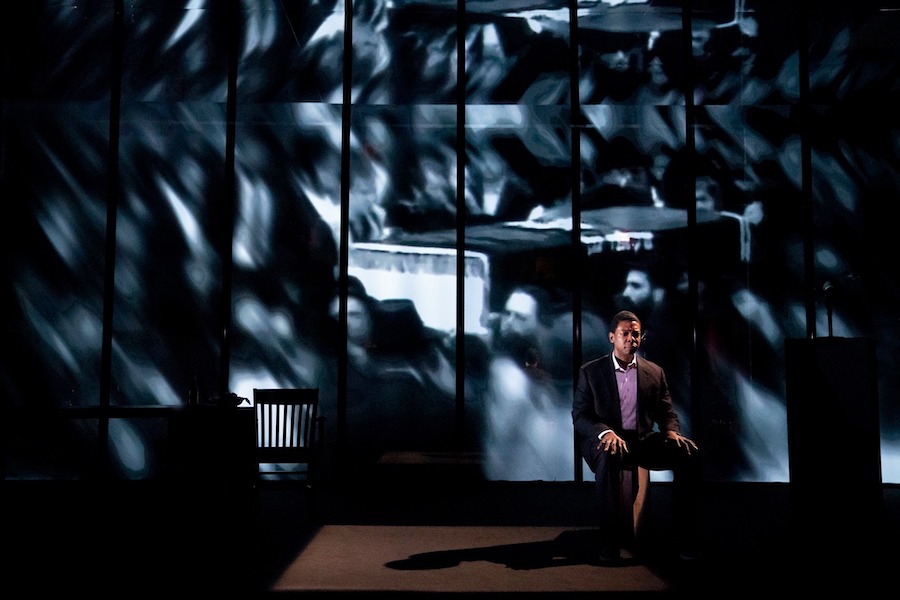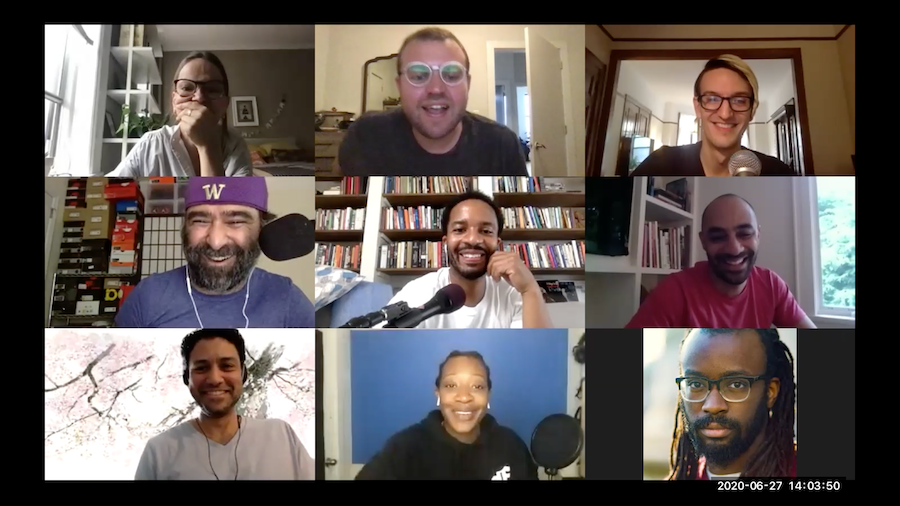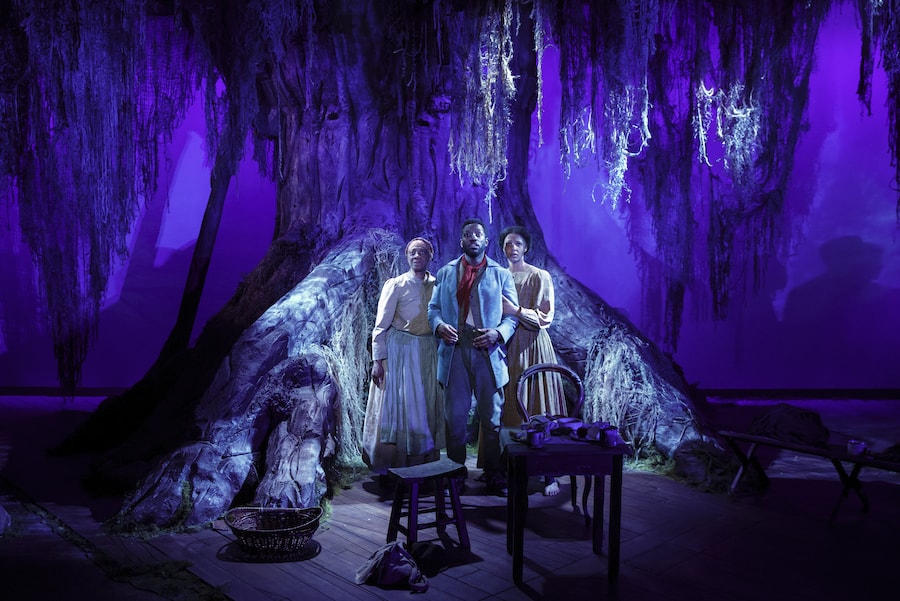“I’m of the opinion that we, as artists, especially in America, are allowed to recreate things in our own way to speak to our times,” says Saheem Ali.
The New York-based director is certainly known for doing this, and for creating full-bodied performances that leave audiences gasping. This season alone, Ali’s résumé boasted Anne Washburn’s Shipwreck at Woolly Mammoth Theatre Company in Washington, D.C., Anna Deavere Smith’s Fires in the Mirror at Signature Theatre, Jeff Augustin’s The New Englanders at Manhattan Theatre Club, and Chris Urch’s The Rolling Stone at Lincoln Center Theater in New York City.\
He was also scheduled to open the Public Theater‘s 2020 free Shakespeare in the Park summer season with Richard II, in what would have been his Delacorte Theatre directorial debut, with a starry cast: André Holland, Miriam A. Hyman, Okwui Okpokwasili, Stephen McKinley Henderson, Estelle Parsons, John Douglas Thompson, Phylicia Rashad, and Michael Gaston.
Like every other theatrical venture in the world, though, the stage production plans were interrupted by COVID-19. Rather than throwing something together that felt untrue to his penchant for establishing rapport with audiences, Ali and the Public Theater devised a solution to continue the project that felt iconoclastic yet classic in spirit: a radio play.
In collaboration with WNYC, a serial radio broadcast of Richard II will air in four parts July 13-16, at 8 p.m. Listeners in the Tri-state area can tune in at WNYC 93.9 FM or AM 820, or stream the broadcast at WNYC.org. WNYC also plans to make the aural experience available as a podcast for on-demand listening. The Public and the company of Richard II have dedicated the production to the Black Lives Matter movement.
Though all are welcome to experience the production, whatever their political alignment, it must be noted how invigorating it is to see an endeavor declare its solidarity with Black lives so openly. This decision aligns with Ali’s own stance. He notes, “There’s always a person of color at the center of my work. That is really important to me, because those are the stories that I want to tell.”
Coming originally from Nairobi, Kenya—where tribalism, not racism, was the main source of friction—Ali found himself embraced by people of color when he arrived in the U.S.
“I love actors, but I especially love actors of color, because I feel that there’s a level of relating to people who have a similar experience,” he says. “When we walk through life, we’re trying to collect our tribe. As I’ve come into this country, I’ve been adopted into the tribe of Black people, and Latinx people, and Asian people. I feel very blessed to be in a country where I didn’t grow up, but where I’m being invited into rooms and given opportunities to tell stories.”
For the past month, Ali and his original cast of 25 actors have been virtually rehearsing an ever-evolving story that takes on greater significance each day that the fight to dismantle white supremacy continues. During their first rehearsal, which began the week after the murder of George Floyd, Ali opened the floor to allow the cast to share their thoughts about the tragedy if they wished, or to simply listen and commiserate.
This is a consistent feature of how Ali works with his collaborators. Though these rehearsals all took place on Zoom, he managed to create a safe space where each person could present their full self, grieve, and begin building a community together, rather than rush straight into the work or push his actors to divorce themselves from their feelings. As demonstrations against police brutality began, this tendency evolved into allowing people to depart rehearsals early to participate in the protests.

Richard II was last performed at the Delacorte in 1987, during the penultimate year of President Reagan’s tenure. We now know that he was stricken with Alzheimer’s at that point, with the First Lady making key decisions on advice of her astrologer. As then, Richard II and its portrayal of the dangers of incompetent leadership makes an apt commentary upon the failures of our current administration.
But rather than focus on the current president directly, as did the Public’s past productions of Julius Caesar or Richard III, Ali has directed his attention to the system that empowers corruption.
“I wanted to de-center the direct political analogy,” he says, “and talk about the structure of power. The divine right of kings is questioned in the play. If you dismantle that, then you have to take responsibility for what comes next. Hopefully the play makes us engage with how to fix our system and to think very carefully about not only dismantling, but reconstruction as well.”
In real world terms, this calls to mind the Egyptian revolution of 2011, which removed one brutal leader from power but allowed an even more authoritarian dictator to take over. This was due in no small part to the activists who helped usurp the system not having a viable plan to take its place. In Richard II, André Holland, who plays the titular king, is deposed—and then Miriam A. Hyman, a Black woman in the role of Henry IV, takes over.
“I wanted to see a Black woman take over from a Black king,” says Ali, noting that race was an enormous factor when looking at who would displace the king. “It is absolutely a statement on its own.” If both ruler and usurper are Black, then race is no longer a pertinent consideration, and it ultimately comes down, not to who a person is but to what they do.

As an artist, Ali shares a mission with the playwright Jocelyn Bioh: to present African stories that expand the narrative beyond stereotypical portrayals of the continent and its many people. This includes an understanding that being Black or African is not monolithic, and explains why Ali decided to keep the action of Richard II in England, rather than reimagining it in an African country.
“I wanted to be very clear that people of color were at the center of the narrative and at the center of power,” he says. “But I wasn’t going to do something that ‘justified’ power being in the hands of people of color” by setting it in Africa. “This cast reflects the world that I want to see onstage, where no one explains to me why the world is that way.”
Ali’s introduction to theatre was a British production of the musical Grease, which he saw while traveling with his father. Upon returning home, the precocious 15-year-old pieced together his own version of the show with a group of friends. Inspired by the experience, he decided to attend college at Northeastern University with a concentration on acting.
It was during his third year there that he found working with unskilled directors unbearable. After trying his own hand at taking command, he fell in love with sculpting interactions and intimacy between actors from every angle—and not just for the sake of the performers, but so that the audience could fully immerse themselves in the experience, no matter where they were sitting. It’s something Anne Bogart commented on while teaching him in grad school at Columbia University. He paid special attention to arranging the seats before his classmates came in, “because where you’re sitting transforms the way you engage with a piece.”
That’s one reason why he has no interest in creating performances for Zoom. During the discussion around possibilities for salvaging the staged performance, Ali was clear that the popular conferencing platform would not work for his vision. More than just eliminating the interaction of senses that can only happen under the specific circumstances of live theatre, Zoom also doesn’t allow a director to shape how the audience will receive the work. Instead of smelling the fresh earth at the feet of a gigantic mystical tree—as in his world premiere production of Donja R. Love’s Sugar in Our Wounds at Manhattan Theatre Club—an online interface means that audiences will engage with the material in a way it was never meant to be received: at home on a toilet, fighting to stay awake on the subway, standing in a social-distanced line at a coffee shop.
Ali does not dismiss Zoom performances—they just aren’t for him. They are a substitute, an emoji hug instead of a pair of warm arms. Some productions have successfully developed work intended specifically for the medium, such as Richard Nelson’s recent additions to the Apple Family play cycle, which bring the Apple family together via Zoom. When adapting Richard II for an audio-only format was suggested, Ali ran with it.
“I started to think, ‘When is a better time for a radio drama than during isolation?’” he shares. “There couldn’t be a better moment for having a drama where it’s just the words and the music.” This follows a tradition of BBC radio adaptations of Shakespearean works, but don’t expect grandiloquent thespians with extravagant, colonially coded accents. “In America, we’ve formed our own relationship with Shakespeare in terms of how it sounds,” he says.
Though audiences will receive the radio play in a way that he cannot influence, knowing that it was crafted for this specific mode of consumption has Ali feeling ecstatic. Noting a famous study about the synchronization of heartbeats among audiences and performers, Ali says, “I believe we are communicating on planes that we’re not even aware of. An audience can feel the intangible—how much you care, how much the actors care, and how much work everyone put in. Those things are present when you are sitting and watching a play. Its authenticity.” Indeed, and it is impossible to fake.

His direction to the cast was to embrace a contemporary sound, speaking the language as it would be spoken today, without a specifically racial lens or imposing an identity aside from their own. The result is a sense of ownership and authority that can go missing in many classical productions in the U.S.
“That’s the dangerous thing about Shakespeare,” Ali says. “Because it came from Britain, it’s like someone else owns it or we’re borrowing it, and that’s simply not true. It is art, and the best art can speak to you no matter what you look like.” This sense of universality has been with Ali since his first foray into theatre: the aforementioned adaptation of Grease with his friends.
“We had no idea that this story was not for us,” he says. “It was set in 1950s white America, but we were so moved by it that we very innocently fell into seeing ourselves in it. This is why I love the Public Theater: It’s for the people, by the people, with a democratization of the thing.” After a pause, he notes, “Shakespeare is greater than the white British dude who wrote it. I really want people who it wasn’t written for to see themselves in it.”
When it came time to record their performances, the Public sent each actor a special microphone that would pick up only their voices. Each scene was performed and recorded in physical isolation, though through virtual Zoom interaction. While they weren’t sharing the same air, Ali’s work with the cast in creating an emotionally vulnerable and safe space allowed them to fully invest into the world of Richard II. After it was over, the actors sent in their recordings to be mixed by the Public, under Ali’s supervision. He notes that they didn’t know what they had until that moment. Happily, the experiment with Zoom rehearsals and audio recordings worked out, he says.
Ali recalls sitting in the dark with his headphones on, listening to André Holland speak as Richard II, saying it was “one of the most beautiful experiences in isolation. I hope that many people have this experience because I felt connected to someone and something outside of myself. Because one of the most dangerous things for a human being is feeling like you’re alone.”
Loneliness and isolation are divisive tactics that white supremacists have used to push people of color to the fringe for centuries. “Divide and conquer,” as Julius Caesar would say. With this radio production of Richard II, Ali is experimenting with how people will react to a drama without visual indicators, such as race.
Much like blind auditions at the New York Philharmonic—in which auditioners have no idea how the person auditioning looks—this will allow audiences to connect with whoever appeals to them naturally, without the burden of implicit bias. The results may surprise you—the person who matters most to you may end up being a Black woman or a Japanese man. In that, Ali is tapping into the most transformative aspect of theatre: the power to build connections among strangers and to change minds.
This production features a predominantly Black cast, none of whom we can see. As Black Lives Matter continues to reshape our society, perhaps this idea will help us build what comes next. Maybe we will start listening to what is being said rather than looking at how the speaker presents.
Juan Michael Porter II is an arts and culture journalist. He has written for TheBody.com, NY Observer, TDF Stages, Time Out NY, BroadwayWorld, SYFY Wire, Electric Literature, HuffPost, Colorlines, Exeunt NYC, and Ballet Review. He is a 2020 National Critics Institute fellow.
Creative credits for production photo: Fires in the Mirror by Anna Deavere Smith; director: Saheem Ali; scenic design: Arnulfo Maldonado; costume design: Dede M. Ayite; lighting design: Alan C. Edwards; sound design: Mikaal Sulaiman; project design: Hannah Wasileski; dialect coach: Dawn-Elin Fraser; production stage manager: Alfredo Macias. Sugar in Our Wounds by Donja R. Love; director: Saheem Ali; scenic design: Arnulfo Maldonado; costume design: Dede Ayite; lighting design: Jason Lyons; sound design: Palmer Hefferan; original music: Michael Thurber; movement: Darrell Grand Moultrie; hair and makeup design: Cookie Jordan.


